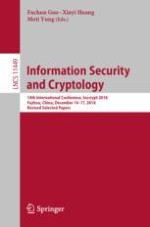2019 | OriginalPaper | Chapter
Two-Round PAKE Protocol over Lattices Without NIZK
Authors : Zengpeng Li, Ding Wang
Published in: Information Security and Cryptology
Publisher: Springer International Publishing
Activate our intelligent search to find suitable subject content or patents.
Select sections of text to find matching patents with Artificial Intelligence. powered by
Select sections of text to find additional relevant content using AI-assisted search. powered by
